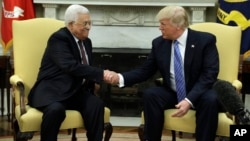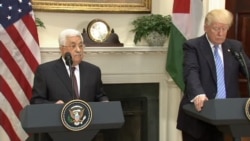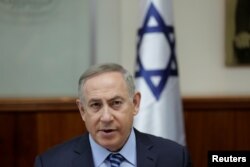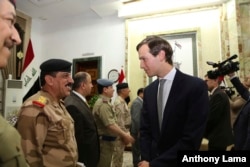Expectations could hardly be lower for a diplomatic breakthrough as Palestinian President Mahmoud Abbas and U.S. President Donald Trump held their first meeting Wednesday at the White House.
Trump said last week he sees “no reason” why there can't be peace between Israel and the Palestinians. “None whatsoever,” Trump said. And Abbas recently declared that a “historic” peace deal to end the decades-old conflict is possible under Trump's leadership.
WATCH: Trump on working with Israel, Palestinians to reach peace deal
Abbas, who heads the West Bank-based Palestinian Authority (PA), has modest goals for the visit. According to Palestinian officials, one of his main objectives will be to simply listen to Trump's plan for reviving peace talks.
But Abbas also hoped to use the meeting to improve his diminished stature both at home and abroad, analysts say.
WATCH: Abbas on desire for recognition of Palestinian State
“What he's trying to do by coming is highlight his relevance and that he has a major role to play and that it'll be hard to get anything done without him,” says Dennis Ross, who has worked on Mideast peace talks under three separate U.S. administrations.
Weakened stature
Abbas is increasingly unpopular at home. The 82-year-old is in the 12th year of what was meant to be a five-year presidential term. A recent poll suggests two-thirds of Palestinians want him to resign, unhappy with the results delivered by what they see as a corrupt PA. His Fatah political party also faces a serious challenge from Hamas, the rival Palestinian group that controls the Gaza Strip.
“That doesn't make it easier for him to make big decisions,” Ross says.
Abbas is also at risk of being sidelined by Trump's efforts to revive Israeli-Palestinian peace talks. Rather than pursue direct talks between the two sides, Trump has suggested recruiting Arab countries to help forge a broader peace agreement.
The approach could be based in part on the 2002 Arab Peace Initiative, which called for the establishment of a Palestinian state in Israeli-occupied territories in exchange for normalized relations between Israel and Arab countries.
Strategy unclear
Just how much influence Abbas would have in such regional talks is unclear. But if Trump is planning to have Arab leaders pressure Abbas to make concessions, that may not work, warns William Quandt, a former U.S. Mideast peace negotiator.
“What's he going to do if people pressure him? He's going to say, ‘We don't accept.’ It's all he can do. That's his legitimacy, is to say no,” Quandt says.
The direction of the peace talks has only become more muddied as a result of Trump's contradictory statements on the Israeli-Palestinian issue.
In February, Trump appeared to upend a long-standing U.S. policy when he announced during a meeting with Israeli Prime Minister Benjamin Netanyahu that he was open to alternatives to a two-state solution.
Though U.S. diplomats later reassured Palestinian officials that the U.S. remains committed to the idea of a Palestinian state, many Palestinians continue to question whether Trump will be an impartial broker.
’No daylight'
During the campaign, Trump promised there would be "no daylight' between his administration and Israel. Since taking office, Trump has also surrounded himself with advisers with deep ties to the Israeli settlement movement.
Diana Buttu, a Ramallah-based political analyst and former spokesperson for the Palestine Liberation Organization, says there is deep skepticism about the role of Jared Kushner, Trump's son-in-law and adviser, who has been given a key role in the talks.
“Will Jared Kushner work? Of course not. He is somebody who has very strong ties with the very movement that has ousted Palestinians from their homeland,” Buttu says, an apparent reference to donations by the Kushner family foundation to West Bank settlements.
Buttu also takes offense at what she sees as Trump's businessman-like approach to the conflict.
“Just slap it together and do a handshake and call it day, like it's some sort of business deal,” she says. “Unless you actually get to those underlying issues, it's never going to be resolved.”
Israeli leaders are also waiting for further details from Trump, including whether he will go ahead with his promise to move the U.S. Embassy from Tel Aviv to Jerusalem, a move that would amount to tacit acceptance of Israeli sovereignty over the entire city.
A U.S. official said Wednesday's meeting would also include the proposal that Abbas halt monthly payments to families of militants jailed or killed by Israel.The issue has been raised in lower-level talks, and Israeli Prime Minister Benjamin Netanyahu this week questioned any prospect for peace while, in his words, the Palestinians "finance murderers."
Not everyone is pessimistic about Trump's push for peace. Alan Baker, a former Israeli ambassador who participated in the negotiating and drafting of the 1993 Oslo Accords, says the time may be right to push for regional peace.
"There's certainly a common threat, when you think about it. There's certainly a common defense interest [among Arab nations and Israel] when it comes to the Iranian threat," he says.
More details could come soon. White House officials have said Trump is said to be considering a trip to Israel, reportedly in late May.









